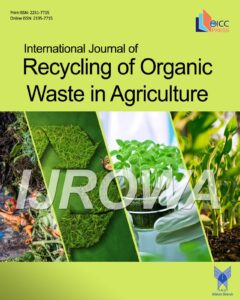Fabrication of a vermifiltration unit for wastewater recycling and performance of vermifiltered water (vermiaqua) on onion (Allium cepa)
Authors
Abstract
Purpose Vemifltration units are sludge-free, noise-free and low- or no-electricity-requiring systems of operation. The aim of this study was to emphasize wastewater treatment by vermifiltration technology using waste-eater earthworms to highlight the benefits of clean and nutritive vermifiltered water (vermiaqua) uses in agriculture to the farmers.
Methods Wastewater sample was filtered through fabricated vermifiltration unit to study physio-chemical and biological properties of vermiaqua and uniform-sized Allium cepa (Onion) bulbs were kept for root germination at different concentrations (10−1, 10−3, 10−5, 10−7, 10−9) of wastewater and vermiaqua at room temperature for 5 days to study impacts of vermiaqua on morphological and cytological characteristics of onion.
Results Vermiaqua was odorless, pale yellow in appearance, lower in turbidity and highly nutritive as ammonia and nitrate contents were highly increased. In E. coli-free vermiaqua, BOD5 loads were also reduced by 91%. Almost all vermiaquatreated root germinations were ‘accelerated’, whereas all wastewater-treated root germinations were ‘retarded’. The highest number of germinated roots was counted at 10−5 concentration of vermiaqua, whereas at the same concentration of wastewater no germination was observed. Many types of chromosomal abnormalities were observed at metaphase and anaphase stages of wastewater-treated roots, whereas the single type of chromosomal abnormality was observed at anaphase stage of vermiaqua-treated roots.
Conclusions Earthworms upgraded the performance of fabricated systems having integrated methods (biological, chemical and physical) of wastewater purification. Morphological and cytological studies revealed vermiaqua highly promoted the root germination without any chromosomal abnormalities.



